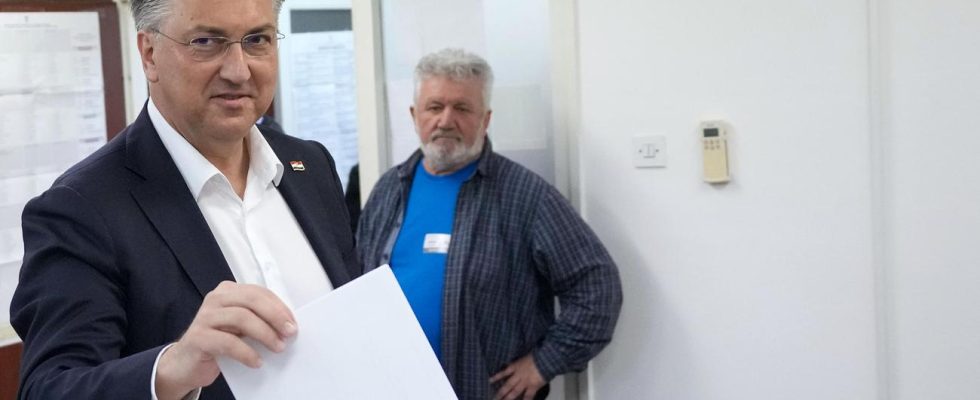According to preliminary partial results, Prime Minister Andrej Plenković’s conservative HDZ party emerged as the strongest force in the parliamentary elections in Croatia. This was announced by the country’s electoral commission. However, the HDZ missed the absolute majority of seats required to form a government.
After counting 64.5 percent of the ballot papers, the HDZ and its allies received 36.1 percent of the vote, according to the election commission. Although Plenković would not yet have an absolute majority, it is possible that he could win over smaller parties and representatives of ethnic minorities to form a coalition. The previous election in 2020 had a similar outcome.
Opposition alliance in second place
According to projections based on the partial results, the left-liberal opposition alliance Rijeke Pravde (Rivers of Justice), which is close to President Zoran Milanović and led by the social democratic SDP, came in second with 26.0 percent of the vote. The right-wing nationalist party Domovinski Pokret (Homeland Movement) took third place with 9.7 percent of the vote.
The conservative-right-wing populist alliance led by the Most (Bridge) party with 7.1 percent and the green-liberal Mozemo (We Can) party with 6.6 percent are also likely to make it into parliament again. The hurdle for this is five percent.
Plenković has ruled since 2016 Croatia, the HDZ has been in power for 26 of the 33 years since the country’s independence. He positions himself as pro-Western and pro-European. However, critics accuse him of continuing the expansion of corrupt networks in the state and administration that his predecessors began.
Corruption allegations against numerous ministers
In the almost eight years of his administration, Plenkovic lost 30 ministers because of corruption scandals. With the recent controversial appointment of senior public prosecutor Ivan Turudić, who is loyal to the HDZ, Plenković now seems to want to put an end to the fight against corruption and the previously fruitful cooperation with the European Public Prosecutor’s Office (EPPO).
Plenković’s prominent opponent, President Milanović, created a better atmosphere in the election campaign. A month before the election, he surprisingly announced that he wanted to become prime minister at the head of an SDP-led government. He based this claim on the corruption allegations against the HDZ. As president with limited power, he used populist rhetoric to draw closer to the extreme right in Croatia. In contrast to Plenković, he attracted attention with Russia-friendly statements regarding the Ukraine war.
It came close to a record General election turnout: Just two and a half hours before the polls closed, it was 50.6 percent, higher than the overall turnout in the last election in 2020, which was 46.9 percent.
According to preliminary partial results, Prime Minister Andrej Plenković’s conservative HDZ party emerged as the strongest force in the parliamentary elections in Croatia. This was announced by the country’s electoral commission. However, the HDZ missed the absolute majority of seats required to form a government.
After counting 64.5 percent of the ballot papers, the HDZ and its allies received 36.1 percent of the vote, according to the election commission. Although Plenković would not yet have an absolute majority, it is possible that he could win over smaller parties and representatives of ethnic minorities to form a coalition. The previous election in 2020 had a similar outcome.

